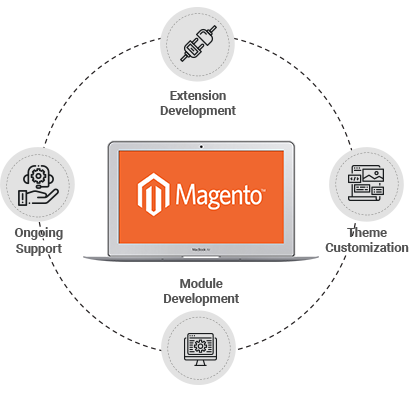Understanding Magento Development
Recognising Understanding Magento’s strong points in terms of enabling complex e-commerce solutions is essential to developing with Magento. One open-source platform that is particularly useful is Magento, which is well-known for its scalability and customisation possibilities. With adjustable pricing criteria, extensive catalogue management, and sophisticated search capabilities, it makes it easier to create feature-rich online businesses.
- Scalability and Flexibility
- Feature-Rich E-commerce Capabilities
- SEO and Marketing Tools
- Mobile-Friendly and Responsive Design
- Integration Capabilities
Dlite Info Tech
Why Magento Development is Crucial for Modern Web Applications

Why Magento Development is Crucial for Modern Web Applications
Modern web applications, especially those in the e-commerce space, depend heavily on Magento development. Building strong and scalable online stores requires a full range of features and capabilities, which Magento’s sophisticated and adaptable platform offers.
Dlite Info Tech Craft Beautiful Websites That Attract And Convert!
We excel in crafting compelling websites that not only capture attention but also yield outcomes. With a team of proficient designers and developers, we’re committed to elevating your online presence into a stunning showcase. We grasp the significance of crafting not only aesthetically pleasing but also practical websites that captivate and convert visitors into devoted patrons.

what you get
Key Benefits of Magento Development
Magento development’s combination of structured development practices, powerful features, and community support makes it an ideal platform for developers aiming to build scalable, secure, and maintainable e-commerce solutions effectively.
Scalability
Flexible Architecture: Magento’s modular and flexible architecture allows businesses to scale their online stores easily. Developers can extend functionality through custom modules and integrations with third-party services, adapting the platform to meet evolving business needs without compromising performance.
Multi-Store Capability: Magento supports the management of multiple storefronts from a single backend installation. This feature enables businesses to cater to different markets, regions, or brands with distinct catalogs, pricing, and promotions, all managed centrally. Each storefront can be customized independently, allowing for targeted marketing and localization efforts.
High Performance and Reliability: Magento is optimized for performance, capable of handling large product catalogs, high traffic volumes, and complex transactions. It incorporates caching mechanisms (e.g., Varnish Cache) and database optimizations to ensure fast page load times and seamless user experiences, even during peak demand periods.
Cloud Scalability: Magento Commerce (formerly Magento Enterprise) offers cloud-hosted solutions that provide scalability out of the box. Cloud deployments on platforms like AWS (Amazon Web Services) or Google Cloud Platform offer auto-scaling capabilities, allowing businesses to dynamically adjust resources based on traffic fluctuations and seasonal demand spikes.
Customization and Flexibility
Modular Architecture: Magento’s modular architecture allows for extensive customization through modules and extensions. Developers can add or modify features, functionalities, and integrations to tailor the platform to specific business needs without altering the core codebase. This flexibility ensures that Magento can adapt to unique requirements and workflows.
Themes and Templates: Magento offers a wide range of customizable themes and templates, allowing businesses to create visually appealing and user-friendly storefronts. Themes can be tailored to reflect brand identity, optimize user experience, and align with marketing strategies, enhancing customer engagement and conversion rates.
Extensions Marketplace: Magento’s marketplace features thousands of extensions and plugins developed by both Magento and third-party providers. These extensions cover various functionalities such as payment gateways, shipping methods, SEO tools, and customer support systems, offering businesses additional customization options to enhance their online stores.
API Integration: Magento provides robust APIs (Application Programming Interfaces) that facilitate seamless integration with third-party applications and services. APIs enable businesses to connect Magento with ERP (Enterprise Resource Planning) systems, CRM (Customer Relationship Management) software, inventory management tools, and other business systems, ensuring data synchronization and workflow automation.
SEO-Friendly
SEO-Friendly URL Structure: Magento allows for customizable URL structures that are optimized for search engines. Users can configure URLs to include relevant keywords and categories, improving visibility and search engine rankings.
Meta Tags and Descriptions: Magento enables customization of meta tags (title, description, keywords) for products, categories, and content pages. This helps search engines understand the content of each page and improves click-through rates in search engine results pages (SERPs).
XML Sitemaps: Magento generates XML sitemaps automatically, which helps search engines discover and crawl all pages within the website more efficiently. This ensures that new content and updates are indexed quickly, enhancing the website’s overall visibility.
Canonical URLs: Magento supports canonical URLs, which prevent duplicate content issues by specifying the preferred version of a URL. This helps consolidate link equity and ensures that search engines correctly attribute ranking signals to the preferred page.
Responsive Design
Mobile-Optimized Themes: Magento offers a variety of responsive themes that are optimized for mobile devices. These themes automatically adjust layouts, images, and content to provide a consistent and user-friendly experience across smartphones, tablets, and desktops.
Flexible Grid System: Magento employs a flexible grid system that allows content blocks and elements to dynamically resize and reposition based on screen size. This ensures that the layout remains visually appealing and functional across different devices and screen resolutions.
Touch-Friendly Interface: Magento’s responsive design includes touch-friendly navigation and controls, making it easy for mobile users to browse products, add items to cart, and complete transactions without encountering usability issues.
Performance Optimization: Magento optimizes performance for mobile devices by minimizing load times and reducing the amount of data transferred. This improves site speed and responsiveness, which is crucial for retaining mobile users and reducing bounce rates.
Rich Feature Set
Advanced Catalog Management: Magento provides robust tools for managing product catalogs, including support for configurable products, product bundles, and virtual products. Merchants can easily organize products into categories, set pricing rules, and manage inventory efficiently.
Powerful Marketing and Promotions: Magento offers a comprehensive suite of marketing and promotional tools to drive sales and customer engagement. Features include discounts, coupons, promotional pricing, upselling, cross-selling, and abandoned cart recovery, enabling businesses to implement effective marketing strategies.
Flexible Payment and Shipping Options: Magento supports a wide range of payment gateways and shipping methods, providing flexibility for global businesses to cater to diverse customer preferences. Integration with major payment providers ensures secure transactions, while configurable shipping options streamline order fulfillment.
Analytics and Reporting: Magento includes built-in analytics and reporting tools that provide insights into sales performance, customer behavior, and website traffic. Merchants can track key metrics, generate reports, and make data-driven decisions to optimize marketing campaigns, inventory management, and overall business operations.
Creating Success
Why Magento Development Services Excel in Today's Market
Scalability and Flexibility
Magento offers unparalleled scalability, allowing businesses to expand their online presence from small startups to large enterprises seamlessly.
Robust E-commerce Capabilities
Magento is renowned for its comprehensive e-commerce features, including advanced catalog management, powerful marketing tools, flexible payment and shipping options, and built-in SEO capabilities.
Community and Support
Magento benefits from a thriving community of developers, merchants, and partners who contribute to its ecosystem.
“Numerique PPC service is light years ahead of the competition because of their intelligent, specialized and courteous account managers.”
Director of Marketing

Magento Development: Demonstrating Effective Solutions with Reflective Success
Magento development has established itself as a robust platform renowned for its ability to streamline e-commerce application development. Embracing Magento means adopting a platform that prioritizes efficiency, security, and scalability—all essential aspects for modern online stores and e-commerce solutions.
Results-Driven
Client-Centric
Innovative Techniques
Client Success Stories
FAQ
FAQs about Magento Development
Interested in learning more about developing with Magento for your e-commerce websites? Browse our FAQs:
Magento is a powerful open-source e-commerce platform written in PHP. It offers a flexible and scalable solution for building online stores with features like catalog management, customer segmentation, and advanced marketing tools.
Magento provides extensive customization options, robust SEO capabilities, multi-store management, and integration with various third-party services. It supports scalability, allowing businesses to grow without technical limitations.
Magento offers a modular architecture that allows developers to extend functionality through custom modules and themes. Businesses can customize layouts, implement unique business logic, and integrate with external systems to meet specific requirements.
Magento has a large and active community of developers, merchants, and partners who contribute to its growth. Resources include forums, documentation, online courses, and extensions marketplace, providing support, updates, and best practices for Magento development.


